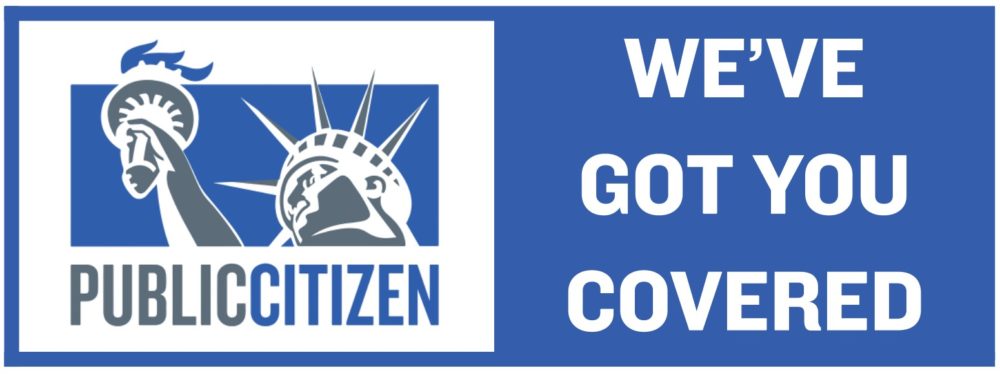Cops Tried to Stop Petition Delivery; Tampa Supports Medicare for All; A Misleading Study

Welcome to this week’s edition of “We’ve Got You Covered,” a weekly tipsheet designed to highlight key news about Medicare for All and call out the biggest industry lies and falsehoods about universal health care. Please send tips, feedback and questions to Mike Stankiewicz, mstankiewicz@citizen.org, (202) 588-7779.
FAMILY BRINGS MEDICAL BILLS TO HILL
In last week’s edition of We’ve Got You Covered, we told you about an upcoming delivery to members of Congress of 2.2 million petition signatures in support of Medicare for All. On Tuesday, we and other groups went to deliver the signatures.
Among the dozens of activists who joined us were the Crespo-Hanover family of Salisbury, Md., who courageously shared their raw pain after losing their family member Danny.
Danny lost his six-figure job after suffering a three-day diabetic-induced coma. He then took a minimum wage job but faced mounting medical debt due to his illness.
The weight of that debt as he struggled with his health led him into a deep depression.
He tried to seek support from therapists but could not afford the copays, so he went without the mental health care he needed. On June 11, he took his own life.
The Crespo-Hanover family brought to the petition delivery a box full of the medical bills that led Danny to feel like a burden to his family.
CAPITOL POLICE TRIED TO STOP PETITION DELIVERY
As for the petition delivery, it went smoothly. Until it didn’t.
About 50 minutes into the event, just as activists entered U.S. Rep. Dave Loebsack’s (D-Iowa) office, a Capitol police officer appeared and informed the group that delivering information to members’ offices was against building regulations. “There’s never been the ability for the public to just hand out deliveries,” the officer said. (You can watch the incident unfold here at the 52.22 mark.) Loebsack’s staff received the petitions regardless.
We’re scratching our heads over this. We at Public Citizen deliver petitions to Congress frequently, as we have done for decades. Funny, but we thought that members of Congress were supposed to hear from constituents and yes, receive information from them. The activists were dropping off three-ring binders containing information about Medicare for All as well as a flash drive containing the signatures. That’s all.
It’s unclear who called the police or why. The group was large but respectful; in most offices the delivery was quick – just a drop-off.
Because the groups’ leaders didn’t want to delay the event to wait for a Capitol police supervisor, they simply went to the next office and continued the delivery. Police did not try to stop them.
We suspect that the cops don’t tell corporate lobbyists they can’t drop off information to offices. Just saying.
TAMPA SUPPORTS MEDICARE FOR ALL
Momentum for Medicare for All continues to grow. On Thursday, the Tampa, Fla., City Council passed a resolution in support of Medicare for All. With a population of about 400,000, it is the third-most-populated city in the swing state. Neighboring St. Petersburg, Fla., passed a similar resolution in June.
Other resolutions have been passed recently in Tucson, Ariz., and Lucas County, Ohio, which includes Toledo. Public Citizen is part of a coalition urging citizens to press their local governments to pass similar resolutions. More than 200 local efforts are underway to pass local resolutions in communities across the United States.
This is how change happens, with grassroots efforts from activists and regular Americans educating their neighbors in their communities and demanding action from their elected officials.
MISLEADING URBAN INSTITUTE STUDY
The Urban Institute recently issued a flawed analysis of health care proposals. How was it flawed?
It relied on several false assumptions, which Physicians for a National Health Program points out here. The first is that Medicare for All would have overhead costs of 6%, even though traditional Medicare’s overhead is about 2%.
The second is that hospitals wouldn’t see any administrative savings under Medicare for All, which they would (this has been acknowledged by such entities as the Congressional Budget Office and Government Accountability Office).
The third flawed assumption is that under Medicare for All, the use of health care services would skyrocket beyond the system’s capacity to deliver services. But when Medicare took effect and millions who previously had been uninsured got access to health care, no such surge occurred. Overall, this means the study estimated much higher costs and much lower savings than Medicare for All likely would achieve.
REMINDER: More than 40 million Americans are underinsured, meaning they’re unable to afford to use their for-profit insurance. Too many Americans are having to depend on GoFundMe or other forms of public begging to afford lifesaving care. Further, around 30 million Americans remain uninsured, meaning they likely have unmet health care needs and face the risk of medical debt or bankruptcy when they get sick.
To speak with a Medicare for All policy expert, or if you have questions about Public Citizen’s work, please contact Mike Stankiewicz, mstankiewicz@citizen.org, (202) 588-7779, or Angela Bradbery abradbery@citizen.org, (202) 588-7741.